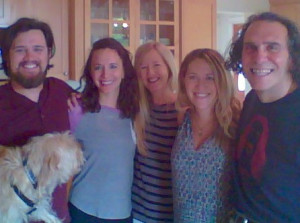The Gift of One More Time

This week, Becky Allender writes about how a single moment, a single meal, or one more family gathering can serve as a lens for reflecting on our entire lives—both the good and the bad. This post originally appeared on Red Tent Living.
It came about unexpectedly. First one child, then another, and finally the last called and said, “I’m going to come over to spend the night too!” It happened quickly and without fanfare. Our excitement grew as we realized our three adult children were coming to spend the night and hang out together. We could not remember the last time we had been alone together, without their spouses and children.
Annie and Amanda requested pedicures when Andrew picked them up on the 2:05 ferry. He dropped them off at the salon and I was waiting next to two seats and tubs of bubbling soapy blue water. Afterwards we stopped by the farm store and bakery, because eating at home sounded better than eating out.
Without direction, we began preparing dinner together. The ease of no nursing babies or grandchildren or spouses to tend to returned us to an era that had passed almost a decade ago. Without words spoken, we felt the holiness of this time and the intentionality of why it was happening. Amanda, our second-born, is six months pregnant and moving to New York City in two weeks. Our lives, work, and travel schedules are complicated, and this was “our” night that came about out of the blue.
We sat down at the usually overcrowded old dining room gateleg table, and the spaciousness of just five of us felt odd. Dan prayed, and we began eating and talking. And then he asked,
“Now that you are adults, what surprises you as you look back at your upbringing?”
There was thoughtful hesitation, and one child began to account for all the fear and pressure she felt while growing up. The other two nodded in agreement, and story upon story came about learning to lie to keep from provoking judgment when they chose to stray from what they knew we wanted.
I immediately felt defensive. Even when I noticed my husband’s efforts to get my attention, I did not know how to backpedal out of the sentences of explanation and justification. After listening to their hurt and anger, tears began rolling down my cheeks. I sat silently until I could speak without crying. Everyone is okay with my tears, which don’t often appear in such settings—we have weathered a psychologist for a husband and father and know that tears are good.
“I am sorry. I am sorry. I wish I had known better as a mom and of course, dear Annie, our firstborn, you bore the brunt of my needing you to be good and polite and successful academically more than the next two. I am sorry. I am sorry the weight was so great.”
“I wish I had not said that you had to be good because your dad was Dan Allender.” This is the sentence that unearths the crack in my own story. I learned early never to ask for help. There were consequences to inconveniencing my mother, who was a driven, perfectionist Martha Stewart type, but with an unstable psyche. I learned not to ask for help and life was much safer.
When I developed asthma as a ten-year-old and could not breathe, it seemed safer to gasp for air and pass out on the floor then to cry out for help. My skills of survival were well honed. And thus, as a wife, I did not want to bother or inconvenience my husband who worked very hard and traveled frequently.
I did not ask for help. We both lived out our broken stories and somehow made it to another day. And what started out as a sweet meal turned in a direction that none of us could have predicted.
There was silence for quite some time. One child said, “For all your failures, I never doubted that you loved me.” Two other heads nodded, and I was left to feel the inexorable weight of both failure and forgiveness.
 We adjourned and cleaned up and found our places on the couches to watch a couple of episodes of Odd Mom Out, a parody of a mom’s life in New York City trying to get her twins into kindergarten, and the courage and shenanigans that have to be pulled to do so. We hugged and went to bed after Andrew surprised Annie with an E.T. doll from Universal Studios. She screamed in horror, almost as loudly as she did as a six-year-old when Santa gave her the same doll! History can be a very sweet healer.
We adjourned and cleaned up and found our places on the couches to watch a couple of episodes of Odd Mom Out, a parody of a mom’s life in New York City trying to get her twins into kindergarten, and the courage and shenanigans that have to be pulled to do so. We hugged and went to bed after Andrew surprised Annie with an E.T. doll from Universal Studios. She screamed in horror, almost as loudly as she did as a six-year-old when Santa gave her the same doll! History can be a very sweet healer.
Dan and I woke up at 4:30 a.m. It had been hard hearing what our kids had said to us. After my first cup of coffee, where I can cling to the mercies that are new every morning, I went next door to his office to pray with him. “Let’s go for a walk and talk.” We did the same walk that we had done the night before, and I talked of how we too found fault with how our parents raised us. We too are broken as they were, and we too failed. And the kicker is, each generation is broken and different. We walked, we prayed, we talked, and we returned home ready—so ready for each child to wake up and be with us.
It was a glorious morning of individual wake-ups and breakfasts! We are like Golden Retrievers, loving our children without remembering a thing of the night before. Our morning was spent looking through old pictures, playing dominoes, and eating leisurely. And what we knew would happen occurred: time passed. It was time. We said good-bye.
Twenty-four holy, never to be had again hours together had come to an end. It passed just like the last 35 years of raising children: unexpected, hard, broken, sweet, and full of love. There are moments that summarize a lifetime. There are 24-hour periods that encompass all the years that came before.
Can a lifetime be summed up in a few words on a tombstone? Can all the years of our parenting—labor, worry, heartache, hope, failure, and redemption—be summed up in a dinner table conversation?
Of course, a life can’t be condensed to a few words or moments, but in fact it is—rightly or wrongly. No matter how violently we may be opposed to “labeling” someone or something, it is how we think.
And what I have again discovered my life to be in summary: broken and harmful—forgiven—and honored and loved. I had no idea a day, let alone a meal, could be a lifetime.
